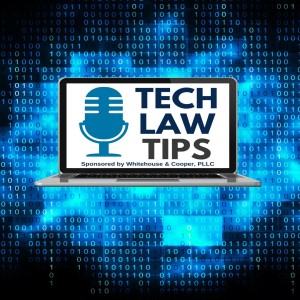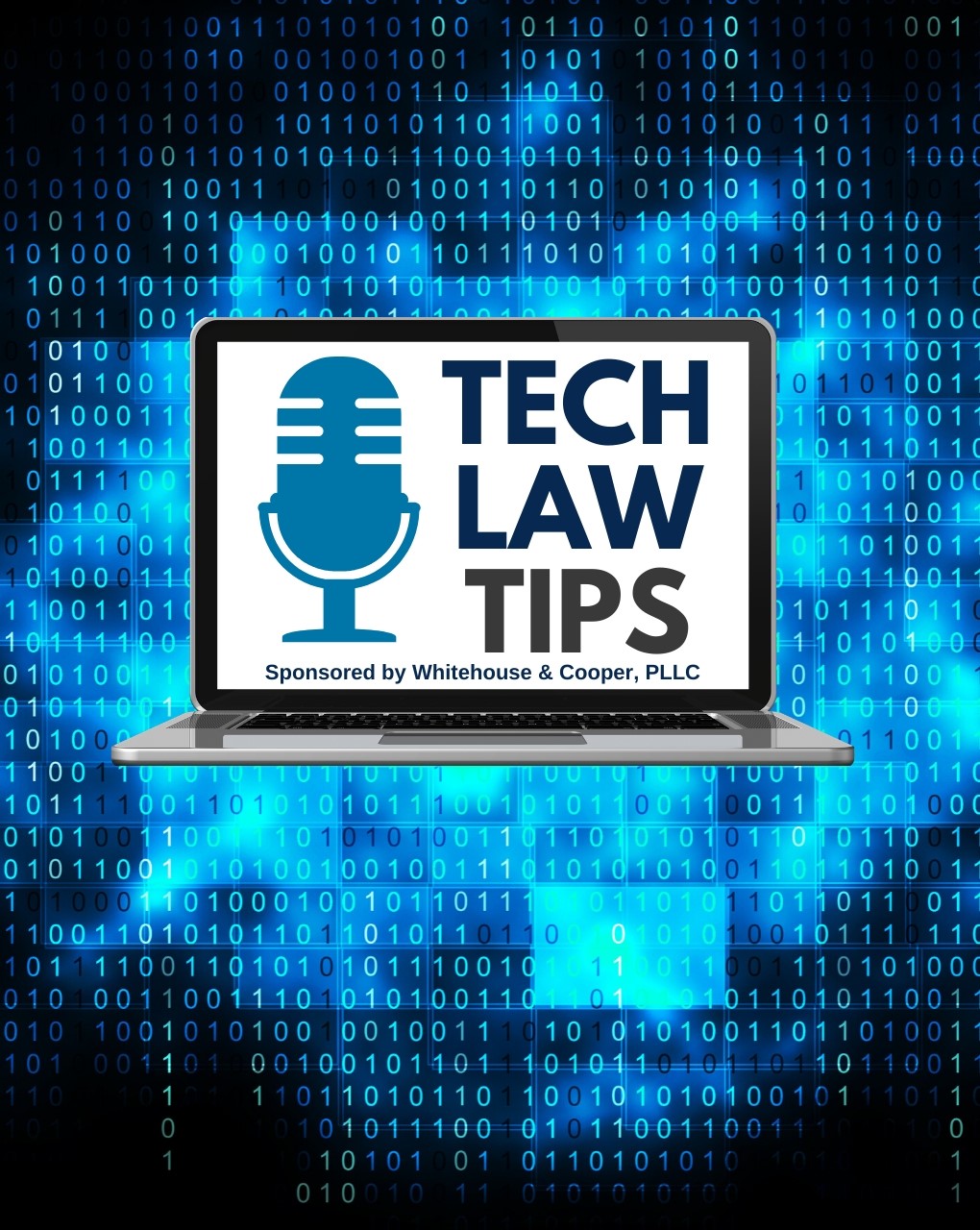Episodes

Tuesday Mar 23, 2021
Protecting your Software
Tuesday Mar 23, 2021
Tuesday Mar 23, 2021
On this episode to the Tech Law Tips podcast, we’ll be talking about a very important topic: protecting your software.
This podcast is sponsored by Whitehouse & Cooper. Your host is Daniel Whitehouse, who is a technology attorney with Whitehouse & Cooper based in Orlando, Florida.
Whitehouse & Cooper works with a lot of software companies, who of course value their intellectual property and cannot allow anyone to benefit from their intellectual property without an appropriate license. So they ask us, how do we protect our intellectual property? As you may know, the three most common forms of intellectual property protection are through copyrights, trademarks, and patents. Those are the mechanisms we use to protect what we consider “public” intellectual property.
One of the issues with copywriting your software is that in order to do that, you have to print out the code, or at least the large portion of it, and send that to the copyright office. By the time the copyright gets back to you and the copyright issued, you've already changed that code. So it's not generally an effective mechanism to protect software. The other consideration is you've taken a large portion of your code and made it available to the public.
On the trademark side, you don't trademark your code. You could trademark the name of your software (which we will discuss in an upcoming episode). But as far as the code or the look and feel of the application, that's not something that you would trademark.
Patenting your software is an opportunity for a very limited subset of software. Even with a patent-eligible piece of software, the issue remains that you’re publishing publicly what you're doing with that software. You're making that information accessible to the world in order to get that patent issued.
What we normally recommend is do treat your software as a trade secret. But you have to take careful steps protect your trade secret. You have to protect your source code from disclosure, which means you will go to great lengths to keep it secret. At a minimum, this means your employees and contractors will sign confidentiality agreements prior to seeing any code. These agreement state that they will not only protect the confidential information—your trade secrets—but that anything they create automatically becomes your property. You must be able to own that intellectual property in order to claim trade secret protection. This brings up another issue regarding working with contractors and the ownership of the software: making sure your agreements with these contractors do in fact say that you are the owner of that software. We like to write these agreements such that you're an owner at the time of the creation of that software.
I've seen agreements in which the purchaser becomes the owner upon payment for the services. The circumstances can vary depending on what you're working with or whom you're working with. Also, if you're dealing with contractors in other countries, what level of protection does that country afford to intellectual property rights? That is something you need to take into consideration.
So generally speaking, our recommendation is that you treat source code as a trade secret. You protect it like a trade secret. If you're wondering how you protect a trade secret, one of the most famous examples out there is the formula to Coca-Cola. It is said that the formula is separated in two separate parts stored in two separate vaults with two different people having the key to those vaults. That's the length that Coca-Cola allegedly goes through to protect its trade secrets. We’re not saying you need to have two vaults and store your source code in each one of those, but be cognizant of how you are protecting your trade secrets.
Let's put it this way: if you're making open source software and storing it on GitHub for everyone to see, that's not software for which you’re seeking trade secret protection.
If you have any other questions or would like to contact us about this or any other technology law related issue, feel free to reach us through the various social media platforms or email us at TLT (at) whitehouse-cooper.com. If you have a topic that you'd like to hear about in the future, please send it to us. We'd love to consider your topics. We're doing this for you. We're doing this for educational purposes and we appreciate your input to the process.

Tuesday Nov 10, 2020
Signing Contracts using Electronic Signatures
Tuesday Nov 10, 2020
Tuesday Nov 10, 2020
On this edition of Tech Law Tips podcast, we're going to talk about a question we receive very, very often, which is: can I sign a document electronically or does it need that handwritten signatures?
This podcast is sponsored by Whitehouse & Cooper. Your host is Daniel Whitehouse, who is a technology attorney with Whitehouse & Cooper based in Orlando, Florida.
We are often asked whether a document can be signed electronically or if it needs an actual handwritten signature that is either hand delivered, emailed, or faxed. The answer most of the time is yes. Yes, you can sign a document electronically, whether you want to use DocuSign or any of the other platforms that are out there. Most legal documents can be signed electronically. There is both federal law and state law that allows the signing of documents electronically. The ESIGN Act is the federal law that many states have adopted at their local level. This allows for many state-based contracts to be effective and enforceable when signed electronically. There's one catch to electronic signatures, though: if you're doing business electronically, you may inadvertently create a contract with someone by communicating electronically.
For example, if you say during an email exchange, “Do you want me to do this?” They reply with, “Yes, I will do that in exchange for X.” That exchange provides the basic components of a contract that may inadvertently have been formed via email, even without a separate signature. Our advice is always to create a contract that has all of the terms spelled out for you so you are not leaving anything to chance in an email. Then the final version of the contract can be signed electronically. You wouldn't believe how many times we get asked that question: should we just agree to this via back and forth via email? We never advised that sending an email is the appropriate mechanism to form the basis of the contract. So sign those documents electronically.
There are some documents, however, that based on state law require a notary signature and many times a notary has to be done in person. So electronic signatures do not work with these types of documents. (Estate documents such as wills and trusts, or real estate documents such as deeds are good examples.)
In Florida as of January 1st, 2020, we have an electronic/remote notary option that has been by our legislature. Some of the online providers haven't necessarily caught up to comply with the statute yet, so do your research on which providers are appropriate for your remote notary options.
Whitehouse & Cooper has used DocuSign for years, and it has streamlined our internal processes considerably. It also helps our clients execute their documents with their customers. We have the option to send documents to both sides for signatures. We've had multimillion-dollar contracts signed using DocuSign, and we really do enjoy the product. (Maybe they should be a sponsor of this podcast! Where are you at, DocuSign??).
If you have any questions or if you'd like to submit a topic for a future episode, you can reach us through the various social media platforms or email us at TLT (at) whitehouse-cooper.com. We will do our best to address your questions in future episodes.

Sunday Sep 13, 2020
Welcome to the Tech Law Tips Podcast!
Sunday Sep 13, 2020
Sunday Sep 13, 2020
Welcome to the first episode of the Tech Law Tips podcast! Your host is Daniel Whitehouse, who is a technology attorney with Whitehouse & Cooper in Orlando, Florida. Whitehouse & Cooper is the sponsor of the Tech Law Tips podcast.
In this episode, we want to tell you a little bit about this podcast, what you can expect, and how you can help contribute to it. At Whitehouse & Cooper, we’re asked a lot of the same questions often, and we wanted to create an outlet to relay some of these frequently asked questions to help your business grow—to help you answer some of the questions that you're obviously having. Each one of our podcasts will address a very specific issue in the area of technology law that you can consider how it might impact your business. These are issues that if you haven't faced yet, you probably will very soon.
That's the goal—to address a specific issue in each episode. If you'd like to submit a topic or a question for us, feel free to do so. You can reach us through the various social media platforms or send us an email at TLT (at) whitehouse-cooper.com. We will do our best to address your questions in future episodes.
We do have to say that none of our podcasts create an attorney-client relationship, nor do they constitute legal advice. You do need to consult your own attorney before you apply any of the information that you may hear from this podcast, because your specific facts and circumstances may be different from the general information we share.
If you like what you hear, please subscribe on all your favorite podcast stations: iTunes, Spotify, Google Play, wherever podcasts are available.
And we look forward to getting to know our audience a little better and, hopefully, you getting to know us a little better as we continue on this podcast journey together.

